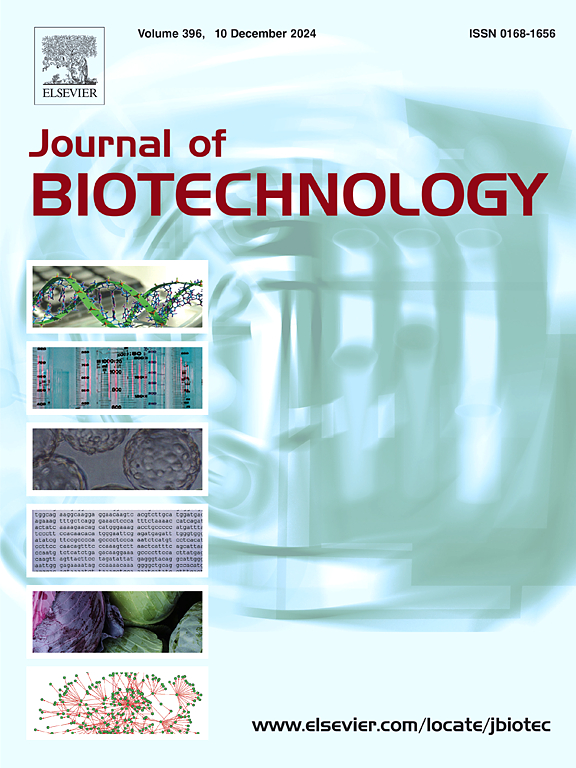麻茶废固定化脂肪酶在无溶剂体系中合成烷基油酸酯。
IF 4.1
2区 生物学
Q2 BIOTECHNOLOGY & APPLIED MICROBIOLOGY
引用次数: 0
摘要
本研究以麻茶渣为原料,利用假丝酵母(Candida rugosa, CRL)固定化脂肪酶,催化油酸与伯脂肪族C2-C12醇的酯化反应。在无溶剂体系中。所采用的固定化方法是吸附法,因为它简单,成本低,并且能够保持酶的活性。研究了十一烷酸、月桂酸和油酸与不同链长醇(乙醇、1-丙醇、1-丁醇、1-辛醇、1-癸醇和1-十二醇)的酯化反应。酯化效率受醇的种类、油酸与醇的摩尔比和反应介质含水量的影响。乙醇(18.5%水,摩尔比为1:5,转化率为23%)和1-癸醇(30%,不加水,摩尔比为1:2)的转化率最高。相比之下,可溶性脂肪酶使用癸醇对油酸的转化率略高(38%),表明性能可能归因于脂肪酶的来源,而不是固定化过程。研究表明,将脂肪酶固定在麻茶渣上对酶的活性没有影响。此外,开发的生物催化剂可以在完全无溶剂的系统中发挥作用,通过将废料重新用于工业酯生产,提供了绿色解决方案。本文章由计算机程序翻译,如有差异,请以英文原文为准。
Hemp tea waste-immobilized lipase for the synthesis of alkyl oleates in solvent free systems
This study explores the immobilization of lipase from Candida rugosa (CRL) on hemp tea waste to catalyze the esterification of oleic acid with primary aliphatic C2-C12 alcohols in a solvent-free system. The immobilization method employed was adsorption, chosen for its simplicity, low cost, and ability to preserve enzyme activity. The esterification of undecanoic acid, lauric acid, and oleic acid with alcohols of varying chain lengths (ethanol, 1-propanol, 1-butanol, 1-octanol, 1-decanol, and 1-dodecanol) was studied. The esterification efficiency was found to be influenced by the type of alcohol, the molar ratio of oleic acid to alcohol, and the water content in the reaction medium. The highest conversions were achieved with ethanol (23 % conversion with 18.5 % water and a molar ratio of 1:5) and 1-decanol (30 % conversion with no added water and a molar ratio of 1:2). Comparatively, the soluble lipase achieved slightly higher conversion of oleic acid using decanol (38 %), indicating that the performance may be attributed to origin of lipase, rather than the immobilization procedure. The study demonstrated that the immobilization of lipase on hemp tea waste did not hinder enzyme activity. Additionally, the biocatalyst developed can function in a completely solvent-free system, offering a green solution by repurposing waste materials for industrial ester production.
求助全文
通过发布文献求助,成功后即可免费获取论文全文。
去求助
来源期刊

Journal of biotechnology
工程技术-生物工程与应用微生物
CiteScore
8.90
自引率
2.40%
发文量
190
审稿时长
45 days
期刊介绍:
The Journal of Biotechnology has an open access mirror journal, the Journal of Biotechnology: X, sharing the same aims and scope, editorial team, submission system and rigorous peer review.
The Journal provides a medium for the rapid publication of both full-length articles and short communications on novel and innovative aspects of biotechnology. The Journal will accept papers ranging from genetic or molecular biological positions to those covering biochemical, chemical or bioprocess engineering aspects as well as computer application of new software concepts, provided that in each case the material is directly relevant to biotechnological systems. Papers presenting information of a multidisciplinary nature that would not be suitable for publication in a journal devoted to a single discipline, are particularly welcome.
 求助内容:
求助内容: 应助结果提醒方式:
应助结果提醒方式:


